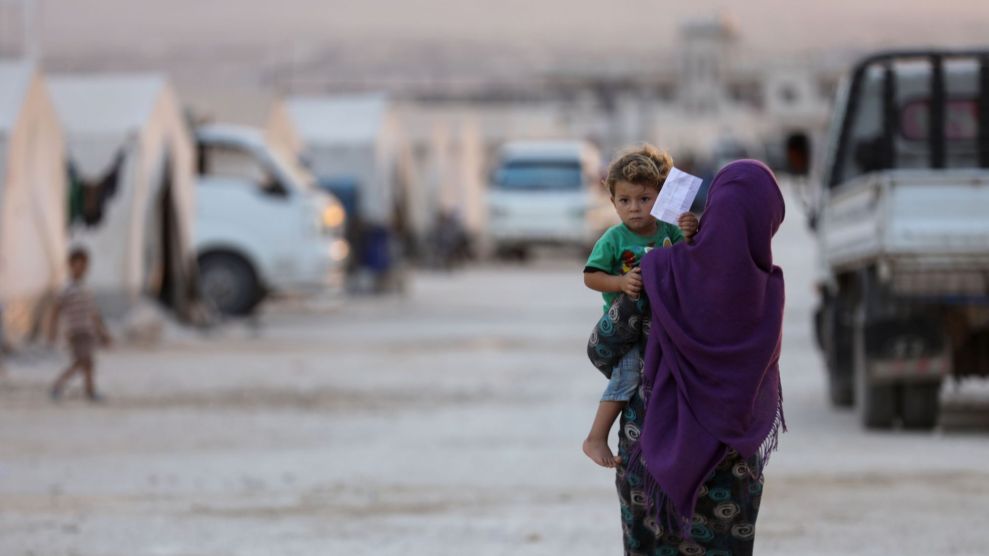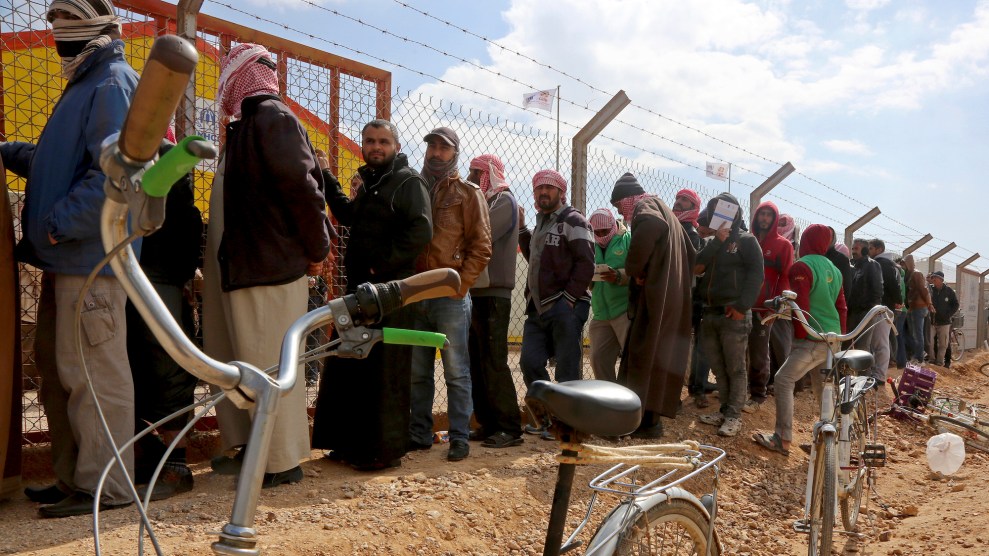On a sweltering July 4 evening, with mosquitoes out in force, Mayor Ted Terry presided over the grill at Clarkston, Georgia’s annual Independence Day pool party. Nigerian pop blared from loudspeakers as a group of women in hijabs sat in the shade, talking and laughing. Toddlers dipped their toes in the wading pool, shrieking with delight. Mayor Ted, as he’s known around town, greeted attendees with one hand and flipped hot dogs with the other.
In downtown Clarkston, you’ll find an array of thriving restaurants—Nepalese, Ethiopian, West African, and that’s just one block. Crime, unemployment, and homelessness are low, and 89 percent of the town’s refugee families are self-sufficient within six months of arrival, which means they no longer accept charity from the aid groups that brought them over. At just 1.4 square miles, Clarkston, with a population of about 13,000, is a dot on the map dwarfed by neighboring Atlanta and its ever-expanding footprint of suburbs and exurbs. But there’s something remarkable about this tiny city: It’s often called the most diverse square mile in the southeastern United States. Half of its residents are immigrants—the vast majority refugees—hailing from more than four dozen countries. The city has two Vietnamese Buddhist temples, a bustling mosque with 800 congregants, an Ethiopian orthodox church, and an innovative middle school for refugee girls whose earlier schooling was interrupted.
Terry, one of the state’s youngest mayors at 35 years old, didn’t create this culture—it has taken three decades for Clarkston to become the global village it is today. But since he was elected in 2013, he has vowed to amplify his city’s message of cultural harmony. Which, given all that has happened since, has proved a challenge indeed.

Mayor Terry meets at Refuge Coffee with a group from St. Thomas More Catholic Church that works on social justice issues.
Raymond McCrea Jones

Ali Ghbis, who has been in the United States about two years, at Refuge Coffee, a local hub for refugees
Raymond McCrea Jones
Clarkston’s diversity would be notable anywhere, but it is especially so in a state that is not exactly known for tolerance. The next town over is Stone Mountain, birthplace of the modern Ku Klux Klan and home to a Confederate theme park that includes massive, carved likenesses of Robert E. Lee, Thomas J. “Stonewall” Jackson, and Jefferson Davis.
No surprise, then, that Clarkston’s vibrant culture was a happy accident. In the 1990s, resettlement agencies took note of the city’s affordable housing, walkability, public transit, and small-town feel and began sending clients there. Clarkston was soon a refugee haven—but for Atlantans, it remained little more than a highway exit en route to the Dixie-themed laser show at Stone Mountain. So Terry resolved to put the place on the map. “Here were all these people doing this incredible work to make this city what it is, and I wanted to showcase it,” he told me.
An appealing host, Terry is tall and athletic, with sandy blond hair and striking blue eyes. For his mayoral duties, he’s paid only $6,000 a year. (Running Georgia’s Sierra Club chapter is his full-time job.) He got his start in politics in 2001, after he moved from his native Florida and found himself canvassing for the Sierra Club. That led to a series of campaign jobs. He moved to Clarkston in 2011 and, not long after, attended a city council meeting where Clarkston’s previous mayor “just generally was dismissive of people’s concerns.” Terry ran against the incumbent and beat him handily.
Terry, whom some call the “hipster mayor,” doesn’t fit the mold of a Georgia politician. He was a vociferous Bernie Sanders supporter and delegate and was recently featured on an episode of Queer Eye, wherein the fab five implored him to ditch his slogan T-shirts and shorts for a more mayoral look. (It didn’t stick: The last time I saw him, he was wearing a beige “Make America Green Again” tee.)
As mayor, Terry recruited a diverse group of millennials and refugees to run for the previously all-white city council. He annexed some of Clarkston’s surrounding neighborhoods, nearly doubling the city’s population and increasing the local tax base. His proudest accomplishments, though, are a slew of measures he says have made Clarkston “the most progressive city in the South.” With the council’s backing, he reduced the fine for possessing small amounts of marijuana from $1,000 to $75, declared Election Day a local holiday, and raised the minimum wage for city workers to $15 an hour.
But Terry’s tenure has coincided with a dark chapter for immigrants. In 2015, after President Barack Obama said the United States would accept 10,000 refugees from war-torn Syria, Gov. Nathan Deal tried (unsuccessfully) to stop any from coming to Georgia. Just over a year later, President Donald Trump’s travel ban for Muslim countries put brakes on the vetting process for incoming refugees. This year, Trump announced that he will cap the overall number of refugees at 30,000, the fewest since the resettlement program began in 1980. These shifts have had a dramatic effect on Georgia’s arrivals. In 2017, the state allowed in 1,075 refugees, 74 of whom were from Syria. In 2018, it has allowed in 670 refugees so far, and just one from Syria.

Terry walks through the Al-Momineen mosque in Clarkston with Altaf Sulaiman, who serves on the mosque’s board and is the main fundraiser for the building’s overhaul.
Raymond McCrea Jones

Terry meets with Dick James, left, and son Kelly James to talk about affordable housing. The Jameses own and run several local apartment complexes.
Raymond McCrea Jones
Terry hopes to counteract such hostility. After Gov. Deal refused to welcome the Syrians, Terry spoke out against him and invited the governor to come to Clarkston to meet some Syrian refugees personally. (Deal declined.) Last May, when state Sen. Michael Williams, in a campaign stunt, came to town with a bus, threatening to round up undocumented immigrants and drive them to the border himself, Terry and a crew of activists confronted him with local police in tow. And after Trump announced that the White House would not hold its customary Iftar dinner for Ramadan, Terry announced that Clarkston would host its own—400 people showed up.
“He’s really thinking about how to make people feel welcome,” says Heval Mohamed Kelli, who came to Clarkston as a Kurdish refugee from Syria in 2001. Kelli, now a cardiologist at Emory University, has since moved to the nearby suburb of Lilburn, but he returns to Clarkston weekly to visit friends at Refuge, a refugee-run café. He also loves to bring new friends to Clarkston. Earlier this year, in fact, Kelli struck up a dialogue with Chris Buckley, a reformed white supremacist, and invited him to the Iftar dinner.
“When I got out of the car I saw all the hijabs, and I thought, ‘Oh, what have I gotten myself into?’” Buckley told me. He had served in Afghanistan, and the scene brought back memories of fighting extremists. But when Kelli brought him to meet his refugee friends and Mayor Terry, “Everyone started welcoming me,” Buckley recalled. “These people just embraced me. I had never seen anything like it. They were fun-loving Americans.”
There’s kind of a Cult of Ted around Clarkston. Hear enough people sing his praises and you get the impression he’s attained godlike status. But it only took one city council meeting to see another side of things. As soon as Terry opened the floor to new business, locals lined up to excoriate him for failing to include them in a plan to allow a group of Southern Baptist missionaries to transform an old church property. The group had envisioned adding amenities the whole town could enjoy—soccer fields, maybe, or a job-training program or business incubator. But people were worried the projects would change the character of their historic neighborhood. “I request that the mayor think seriously about his role in open and good government,” said one longtime Clarkstonian. Another middle-aged male complainant, who muttered angrily under his breath as he waited to speak and used considerably more colorful language, was escorted out by security.
Terry seemed genuinely wounded. “Just imagine if you had to be on the receiving end of someone saying you’re lying, sneaky, breaking the law,” he said after the perpetrator was removed. “I’m not sure when it became acceptable to level personal attacks at our fellow neighbors without evidence.”

Terry greets a Syrian Refuge Coffee employee who is seeking asylum.
Raymond McCrea Jones
A week later, I meet up with Terry at an Ethiopian coffeehouse downtown. The England-Croatia game is on and the shop is full of boisterous fans, many of whom stop by our table to greet their mayor. When I mention the tense council meeting, Terry tells me he met with several of the complainants prior to the meeting and was under the impression their concerns had been addressed. “Did you notice that all of the residents who complained were over the age of 50?” he says after a pause. “Those are the same people who complain about youth wandering through our neighborhoods and causing problems. Job training, soccer fields—this is an opportunity for young people to have something to do!” But not a single refugee showed up to the meeting, he laments.
There’s a reason refugees might not feel welcome. In 2013, Terry’s predecessor, Emanuel Ransom, requested that the governor put a moratorium on refugee resettlement in Clarkston. “We were so inundated with refugees that we couldn’t keep up,” Ransom recalls. “We needed people telling these people not to flush certain things down the toilet. Our lakes had sewage in them. We were flooded with fires in the apartment buildings because no one taught them that you can’t set a fire to cook food on the living room floor.” (Paidia Mixon, CEO of New American Pathways, believes such claims are apocryphal. “I have never known a client to try to cook food in their living room because they didn’t know how to use the stove,” she told me. “That story has been going around for 20 years.”)
Today Ransom seems a little sore that Terry is being credited with Clarkston’s success. “The things that are happening now were being formulated when I was in office,” he says. Terry, he adds, is young. “He has a lot of future ambitions. He is looking for a plan for his own life.”
Fair enough. Terry seems pretty confident his political career won’t end in Clarkston: “Being governor someday, now that might be cool.” But he’s got three and a half years left in his term, and plenty to occupy him. In particular, he frets about the Trump administration’s hobbling of the refugee program. A lack of new arrivals means more rental-housing vacancies, which has been shown to increase crime. Local businesses that depend on refugee shoppers may struggle. But mostly, he says he’s just frustrated, given all Clarkston has to offer families fleeing from persecution, that state and federal authorities won’t let the city do what it does best.
Terry is nevertheless optimistic. He plans to annex more surrounding areas and, using the new tax revenue, create services to attract young families. “People are beginning to notice how different Clarkston is, and diversity is a really attractive quality to a lot of people,” he says. “I’m hoping that the diversity is cemented here.”
Watching the mayor do his thing, it’s clear his “hope” goes beyond the usual political bluster. As the sun sets on the July 4 barbecue, Terry begs a group of young Ethiopian families not to leave just yet. “Stick around till 8:15,” he says. “You don’t want to miss sparklers and the national anthem, do you?”
This story has been edited for clarification.












